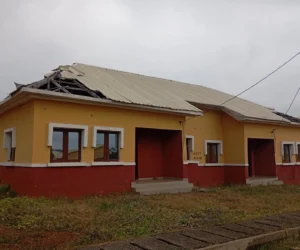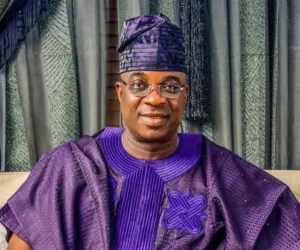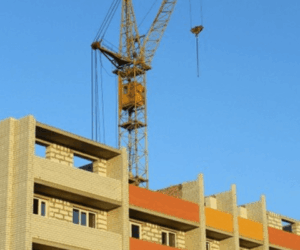2
As the global wave of artificial intelligence (AI) continues to redefine industries, the Chemical and Non-Metallic Products Senior Staff Association of Nigeria (CANMPSSAN) has stepped to the frontlines of this transformation, urging workers and employers alike to adapt responsibly to the fast-changing world of work.
This call to action reverberated through Abeokuta on Wednesday, November 12, 2025, as CANMPSSAN opened its 30th Annual National Management and Industrial Relations Seminar at the MITROS Residence Gateway Annex.
The gathering, themed “AI Technological Revolution on Industrial Relations Practices: Opportunities and Challenges for Chemical and Non-Metallic Products,” drew an impressive mix of labour leaders, captains of industry, and policy experts.
Comrade (Engr.) Segun Samson David, the National President of CANMPSSAN, in his welcome address, underscored the urgency of understanding AI’s implications for industrial relations and workers’ welfare, describing the seminar as both a learning ground and a mobilising platform.
“We meet today at a defining moment in the world of work,” David said.
“The rapid advancement of artificial intelligence is transforming industries, redefining skills, and reshaping industrial relations. For us as a union, these changes present enormous opportunities, but they also demand vigilance, foresight, and creativity to protect the interests and well-being of workers.”
The CANMPSSAN President emphasised that the union’s mission is not to resist technological progress but to ensure that workers are not left behind in its wake.
He called on both employers and employees to prioritise investment in human capital development through continuous education and skills upgrading.
“AI has enhanced efficiency, productivity, and competitiveness across industries, particularly manufacturing,” he said.
“But we must also address the potential risks, job security, workplace relations, and the general well-being of our members.”
This year’s seminar, according to him, is structured to deepen participants’ understanding of the interplay between innovation and worker welfare. Key topics include Stress and Mental Health Management for Workers’ Efficiency, Employment and Self-Sustainability, Building Incremental Factors on Job Security and HSE in the Workplace, and Redundancy and Its Implications for Employees and Employers.
He said the discussions are designed to help participants anticipate and adapt to the realities of automation and industrial digitization.
“This is not just another seminar,” he noted. “It is a call to action, to embrace innovation without losing sight of the human face of progress.”
Comrade David also used the occasion to highlight the economic turbulence confronting Nigerian workers and manufacturers. Although the country has recorded marginal progress in controlling inflation, he noted that the cost of living remains painfully high.
“Inflation may have declined from 20.12% to 18.02% year-on-year,” he observed, “but prices of food, energy, transport, and basic services remain high, eroding real incomes and pushing more Nigerians into poverty.”
He lamented that many households are now forced to cut back on essentials like food, health, and education, while the government’s social safety nets remain too weak to provide meaningful relief.
David described the nation’s economic situation as “a crisis of resilience,” with infrastructure deficits, insecurity, and high borrowing costs crippling the manufacturing sector, the very backbone of job creation.
A major theme of David’s address was the crippling effect of Nigeria’s high interest rate regime on the real sector. With the Central Bank’s Monetary Policy Rate (MPR) hovering around 27%, and commercial bank lending rates rising above 30%, manufacturers, he said, are being strangled.
“A manufacturer borrowing at 35% cannot compete with a counterpart abroad borrowing at 5%,” he warned.
“High interest rates increase input costs, slow production, and force companies to either cut jobs or close down.”
He called for a policy rethink to strike a balance between curbing inflation and promoting industrial growth. According to him, “High interest rates and weak manufacturing equal economic stagnation.”
On power and energy, the CANMPSSAN President painted a grim picture of the production environment. With erratic electricity supply and skyrocketing energy costs, manufacturers are forced to rely heavily on diesel and gas.
“This is unsustainable,” he said. “The banded electricity tariff regime has further compounded the problem. Manufacturers paying exorbitant tariffs lose competitiveness both locally and globally.”
He called for urgent reforms in Nigeria’s energy pricing and supply systems to enhance industrial output and sustain jobs.
Turning to the government’s proposed tax reforms, especially the planned 5% fuel surcharge taking effect in January 2026, David warned that without careful implementation, the policy could worsen hardship for workers and manufacturers alike.
“We are in the worst cost-of-living crisis in generations,” he said.
“Tax reform should expand the base and promote fairness, not deepen the suffering of citizens or weaken struggling industries.”
He urged policymakers to focus on transparent implementation, equitable burden-sharing and practical incentives for manufacturing firms that create jobs.
David also spoke candidly on Nigeria’s security and governance challenges, describing them as the twin obstacles holding the economy hostage.
“No investor will commit funds in an unsafe environment,” he said.
“Our government must align with international best practices in tackling insecurity. Fiscal indiscipline, corruption, and leakages must be addressed decisively.”
He called for transparency and accountability in public spending, arguing that economic recovery cannot take root in a system that rewards waste and punishes productivity.
Beyond the economic lens, he warned that worsening living conditions could lead to growing social unrest, particularly among Nigeria’s restless youth population.
“We cannot continue to clamp down on symptoms while ignoring the disease,” he cautioned.
“Unemployment, inequality, and despair are the real threats to peace. The government must act with urgency and compassion.”
On internal matters, the CANMPSSAN leader announced significant progress on the association’s Guest House project, commending Nigerite Ltd for its additional donation of 335 roofing sheets, bringing the total to 1,185, valued at N8.9 million.
He urged other companies within the sector to emulate Nigerite’s generosity, stressing that collective goodwill remains vital for completing the project.
In his closing remarks, Comrade David expressed deep appreciation to all stakeholders, from industry partners to the Central Working Committee (CWC), the National Executive Council (NEC), and the association’s secretariat staff for their dedication to the union’s ideals.
“You are the wall I lean on,” he said, acknowledging their commitment to CANMPSSAN’s growth and unity.
He urged participants to make the most of the seminar by sharing knowledge, engaging actively, and returning to their workplaces equipped to promote industrial harmony and innovation.
“Together, let us chart a path where technology serves humanity,” he declared. “Let the future of work be one that upholds dignity, fairness, and shared prosperity.”
As the seminar continues through the week, one thing is clear: CANMPSSAN’s 30th gathering in Abeokuta has become more than a labour event, it is a forward-thinking response to the greatest challenge of our time, as Nigerian workers brace for a digital future that demands both adaptation and advocacy.








